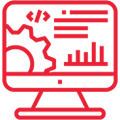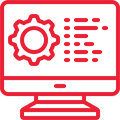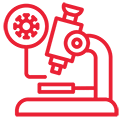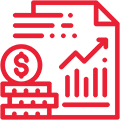The ultimate goal of our DevOps engineering is to bring your product(s) to market faster, roll out software updates more regularly, and make the entire process more reliable. Smoother production cycles require a strong system for collaboration between software engineers and IT operations. Many IT departments have very strong divisions between development, operations, support, and management. With implementing a DevOps system, we aim to break those barriers. By integrating each team in an IT department, the entire process flows more smoothly. Our expert developers are able to get faster feedback from QA, quickly test changes before launch, and suggestions can flow more freely. Our DevOps statistics back up its effectiveness.
DevOps Engineering Services.
DevOps Engineering
Services
Let's get started!
Automate All The Things
Typically, our first Eureka moment occurs through the exposure to the vast array of automation tools within the DevOps space. Automating builds, deployments, backups, upgrades, tests, report generation, scaling up: the number of things one can offload is profound, saving a significant amount of human time. In addition to that, trust begins to build throughout an entire organization due to the increase in consistency, quality, and redundancy in what’s being delivered. This allows one to confidently abstract away mundane tasks and focus on higher order systems. The net result is an organization can focus more of their effort on innovation and creativity.
Kaizen (Continuous Improvement)
Once a certain level of automation is in place, wonderful things start to happen! Time begins to free up, resulting in some free time to begin identifying other bottlenecks to eliminate. This re-investment of time begins to act like compound interest, which begins to build momentum both short, mid, and long term. By creating visibility through the inclusion of reporting metrics, an individual or organization can further identify what areas to improve or eliminate to achieve its goals.
Holistic Approach
If an organization begins to look at how work flows from idea to done through each segment of the company, it quickly becomes apparent that one cannot optimize the ability to deliver value without first identifying the bottleneck. As the adage goes, any optimization that is not at the bottleneck is an illusion because everything will still pile up at that one point. Therefore, in the DevOps mindset, one has to look at the entire process holistically and ensure a collective responsibility across all segments. If done properly, the ability to get more work done increases and one can start to innovate and focus on higher order challenges. The net result is a win for the organization, it’s employees, and it’s customers.
Value Focused
Ultimately an organization that adopts a DevOps mindset will develop a culture that focuses on delivering things of meaningful value to the business and its customers. This is important because velocity without a purpose can turn a virtuous cycle back into a vicious cycle resulting in a lot of effort with no progress.











